- Home
- Nick Hornby
Juliet, Naked
Juliet, Naked Read online
Table of Contents
Title Page
Copyright Page
Dedication
one
two
three
four
five
six
seven
eight
nine
ten
eleven
twelve
thirteen
fourteen
fifteen
Acknowledgements
ABOUT THE AUTHOR
ALSO BY NICK HORNBY
FICTION
HIGH FIDELITY
ABOUT A BOY
HOW TO BE GOOD
A LONG WAY DOWN
SLAM
NONFICTION
FEVER PITCH
SONGBOOK
THE POLYSYLLABIC SPREE
HOUSEKEEPING VS. THE DIRT
SHAKESPEARE WROTE FOR MONEY
ANTHOLOGY
SPEAKING WITH THE ANGEL
RIVERHEAD BOOKS
Published by the Penguin Group
Penguin Group (USA) Inc., 375 Hudson Street, New York,
New York 10014, USA Penguin Group (Canada), 90 Eglinton Avenue
East, Suite 700, Toronto, Ontario M4P 2Y3, Canada (a division of Pearson
Canada Inc.) Penguin Books Ltd, 80 Strand, London WC2R 0RL,
England Penguin Ireland, 25 St Stephen’s Green, Dublin 2, Ireland
(a division of Penguin Books Ltd) Penguin Group (Australia),
250 Camberwell Road, Camberwell, Victoria 3124, Australia (a division of
Pearson Australia Group Pty Ltd) Penguin Books India Pvt Ltd,
11 Community Centre, Panchsheel Park, New Delhi-110 017, India Penguin
Group (NZ), 67 Apollo Drive, Rosedale, North Shore 0632, New Zealand
(a division of Pearson New Zealand Ltd) Penguin Books (South Africa)
(Pty) Ltd, 24 Sturdee Avenue, Rosebank, Johannesburg 2196, South Africa
Penguin Books Ltd, Registered Offices: 80 Strand, London WC2R 0RL, England
Copyright © 2009 by Nick Hornby
All rights reserved. No part of this book may be reproduced, scanned, or
distributed in any printed or electronic form without permission. Please do not
participate in or encourage piracy of copyrighted materials in violation of the
author’s rights. Purchase only authorized editions.
Published simultaneously in Canada
Library of Congress Cataloging-in-Publication Data
Hornby, Nick.
Juliet, naked / Nick Hornby.
p. cm.
eISBN : 978-1-101-14054-3
1. Rock music fans—Fiction. 2. Man-woman relationships—Fiction.
3. Loneliness—Fiction. 4. Musical fiction. I. Title.
PR6058.0689J
823’.914—dc22
This is a work of fiction. Names, characters, places, and incidents either
are the product of the author’s imagination or are used fictitiously, and any
resemblance to actual persons, living or dead, businesses, companies,
events, or locales is entirely coincidental.
While the author has made every effort to provide accurate telephone numbers and
Internet addresses at the time of publication, neither the publisher nor the author
assumes any responsibility for errors, or for changes that occur after publication.
Further, the publisher does not have any control over and does not assume any
responsibility for author or third-party websites or their content.
http://us.penguingroup.com
Version_2
For Amanda, with love and thanks
one
They had flown from England to Minneapolis to look at a toilet. The simple truth of this only struck Annie when they were actually inside it: apart from the graffiti on the walls, some of which made some kind of reference to the toilet’s importance in musical history, it was dank, dark, smelly and entirely unremarkable. Americans were very good at making the most of their heritage, but there wasn’t much even they could do here.
“Have you got the camera, Annie?” said Duncan.
“Yes. But what do you want a picture of ?”
“Just, you know . . .”
“No.”
“Well . . . the toilet.”
“What, the . . . What do you call those things?”
“The urinals. Yeah.”
“Do you want to be in it?”
“Shall I pretend to have a pee?”
“If you want.”
So Duncan stood in front of the middle of the three urinals, his hands placed convincingly in front of him, and smiled back over his shoulder at Annie.
“Got it?”
“I’m not sure the flash worked.”
“One more. Be silly to come all the way here and not get a good one.”
This time Duncan stood just inside one of the stalls, with the door open. The light was better there, for some reason. Annie took as good a picture of a man in a toilet as one could reasonably expect. When Duncan moved, she could see that this toilet, like just about every other one she’d ever seen in a rock club, was blocked.
“Come on,” said Annie. “He didn’t even want me in here.”
This was true. The guy behind the bar had initially suspected that they were looking for a place where they could shoot up, or perhaps have sex. Eventually, and hurtfully, the barman had clearly decided that they were capable of doing neither thing.
Duncan took one last look and shook his head. “If toilets could talk, eh?”
Annie was glad this one couldn’t. Duncan would have wanted to chat to it all night.
Most people are unaware of Tucker Crowe’s music, let alone some of the darker moments of his career, so the story of what may or may not have happened to him in the restroom of the Pits Club is probably worth repeating here. Crowe was in Minneapolis for a show and had turned up at the Pits to see a local band called the Napoleon Solos which he’d heard good things about. (Some Crowe com pletists, Duncan being one, own a copy of the local band’s one and only album, The Napoleon Solos Sing Their Songs and Play Their Guitars.) In the middle of the set, Tucker went to the toilet. Nobody knows what happened in there, but when he came out, he went straight back to his hotel and phoned his manager to cancel the rest of the tour. The next morning he began what we must now think of as his retirement. That was in June 1986. Nothing more has been heard of him since—no new recordings, no gigs, no interviews. If you love Tucker Crowe as much as Duncan and a couple of thousand other people in the world do, that toilet has a lot to answer for. And since, as Duncan had so rightly observed, it can’t speak, Crowe fans have to speak on its behalf. Some claim that Tucker saw God, or one of His representatives, in there; others claim he had a near-death experience after an overdose. Another school of thought has it that he caught his girlfriend having sex with his bass player in there, although Annie found this theory a little fanciful. Could the sight of a woman screwing a musician in a toilet really have resulted in twenty-two years of silence? Perhaps it could. Perhaps it was just that Annie had never experienced passion that intense. Anyway. Whatever. All you need to know is that something profound and life-changing took place in the smallest room of a small club.
Annie and Duncan were in the middle of a Tucker Crowe pilgrimage. They had wandered around New York, looking at various clubs and bars that had some kind of Crowe connection, although most of these sites of historic interest were now designer clothes stores, or branches of McDonald’s. They had been to his childhood home in Bozeman, Montana, where, thrillingly, an old lady came out of her house to tell them that Tucker used to clean her husband’s old Buick when he was a kid. The C
rowe family home was small and pleasant and was now owned by the manager of a small printing business, who was surprised that they had traveled all the way from England to see the outside of his house, but who didn’t ask them in. From Montana they flew to Memphis, where they visited the site of the old American Sound Studio (the studio itself having been knocked down in 1990), where Tucker, drunk and grieving, recorded Juliet, his legendary breakup album, and the one Annie liked the most. Still to come: Berkeley, California, where Juliet—in real life a former model and socialite called Julie Beatty—still lived to this day. They would stand outside her house, just as they had stood outside the printer’s house, until Duncan could think of no reason to carry on looking, or until Julie called the police, a fate that had befallen a couple of other Crowe fans that Duncan knew from the message boards.
Annie didn’t regret the trip. She’d been to the U.S. a couple of times, to San Francisco and New York, but she liked the way Tucker was taking them to places she’d otherwise never have visited. Bozeman, for example, turned out to be a beautiful little mountain town, surrounded by exotic-sounding ranges she’d never heard of: the Big Belt, the Tobacco Root, the Spanish Peaks. After staring at the small and unremarkable house, they walked into town and sipped iced tea in the sunshine outside an organic café, while in the distance the odd Spanish Peak, or possibly the top of a Tobacco Root, threatened to puncture the cold blue sky. She’d had worse mornings than that on holidays that had promised much more. It was a sort of random, pin-sticking tour of America, as far as she was concerned. She got sick of hearing about Tucker, of course, and talking about him and listening to him and attempting to understand the reasons behind every creative and personal decision he’d ever made. But she got sick of hearing about him at home, too, and she’d rather get sick of him in Montana or Tennessee than in Gooleness, the small seaside town in England where she shared a house with Duncan.
The one place that wasn’t on the itinerary was Tyrone, Pennsylvania, where Tucker was believed to live, although, as with all orthodoxies, there were heretics: two or three of the Crowe community subscribed to the theory—interesting but preposterous, according to Duncan—that he’d been living in New Zealand since the early nineties. Tyrone hadn’t even been mentioned as a possible destination when they’d been planning the trip, and Annie thought she knew why. A couple of years ago, one of the fans went out to Tyrone, hung around, eventually located what he understood to be Tucker Crowe’s farm; he came back with a photograph of an alarmingly grizzled-looking man aiming a shotgun at him. Annie had seen the picture, many times, and she found it distressing. The man’s face was disfigured by rage and fear, as if everything he’d worked for and believed in was in the process of being destroyed by a Canon Sure Shot. Duncan wasn’t too concerned about the rape of Crowe’s privacy: the fan, Neil Ritchie, had achieved a kind of Zapruder level of fame and respect among the faithful that Annie suspected Duncan rather envied. What had perturbed him was that Tucker Crowe had called Neil Ritchie a “fucking asshole.” Duncan couldn’t have borne that.
After the visit to the restroom at the Pits, they took advice from the concierge and ate at a Thai restaurant in the River-front District a couple of blocks away. Minneapolis, it turned out, was on the Mississippi—who knew, apart from Americans, and just about anyone else who’d paid attention in geography lessons?—so Annie ended up ticking off something else she’d never expected to see, although here at the less romantic end it looked disappointingly like the Thames. Duncan was animated and chatty, still unable quite to believe that he’d been inside a place that had occupied so much of his imaginative energy over the years.
“Do you think it’s possible to teach a whole course on the toilet?”
“With you just sitting on it, you mean? You wouldn’t get it past Health and Safety.”
“I didn’t mean that.”
Sometimes Annie wished that Duncan had a keener sense of humor—a keener sense that something might be meant humorously, anyway. She knew it was too late to hope for actual jokes.
“I meant, teach a whole course on the toilet in the Pits.”
“No.”
Duncan looked at her.
“Are you teasing me?”
“No. I’m saying that a whole course about Tucker Crowe’s twenty-year-old visit to the toilet wouldn’t be very interesting.”
“I’d include other things.”
“Other toilet visits in history?”
“No. Other career-defining moments.”
“Elvis had a good toilet moment. Pretty career-defining, too.”
“Dying’s different. Too unwilled. John Smithers wrote an essay for the website about that. Creative death versus actual death. It was actually pretty interesting.”
Annie nodded enthusiastically, while at the same time hoping that Duncan wouldn’t print it off and put it in front of her when they got home.
“I promise that after this holiday I won’t be so Tucker-centric,” he said.
“That’s okay. I don’t mind.”
“I’ve wanted to do this for a long time.”
“I know.”
“I’ll have got him out of my system.”
“I hope not.”
“Really?”
“What would there be left of you, if you did?”
She hadn’t meant it cruelly. She’d been with Duncan for nearly fifteen years, and Tucker Crowe had always been part of the package, like a disability. To begin with, the condition hadn’t prevented him from living a normal life: yes, he’d written a book, as yet unpublished, about Tucker, lectured on him, contributed to a radio documentary for the BBC and organized conventions, but somehow these activities had always seemed to Annie like isolated episodes, sporadic attacks.
And then the Internet came along and changed everything. When, a little later than everyone else, Duncan discovered how it all worked, he set up a website called “Can Anybody Hear Me?”—the title of a track from an obscure EP recorded after the wounding failure of Crowe’s first album. Until then, the nearest fellow fan had lived in Manchester, sixty or seventy miles away, and Tucker met up with him once or twice a year; now the nearest fans lived in Duncan’s laptop, and there were hundreds of them, from all around the world, and Duncan spoke to them all the time. There seemed to be a surprising amount to talk about. The website had a “Latest News” section, which never failed to amuse Annie, Tucker no longer being a man who did an awful lot. (“As far as we know,” Duncan always said.) There was always something that passed for news among the faithful, though—a Crowe night on an Internet radio station, a new article, a new album from a former band member, an interview with an engineer. The bulk of the content, though, consisted of essays analyzing lyrics, or discussing influences, or conjecturing, apparently inexhaustibly, about the silence. It wasn’t as if Duncan didn’t have other interests. He had a specialist knowledge of 1970s American independent cinema and the novels of Nathanael West and he was developing a nice new line in HBO television series—he thought he might be ready to teach The Wire in the not-too-distant future. But these were all flirtations, by comparison. Tucker Crowe was his life partner. If Crowe were to die—to die in real life, as it were, rather than creatively—Duncan would lead the mourning. (He’d already written the obituary. Every now and again he’d worry out loud about whether he should show it to a reputable newspaper now, or wait until it was needed.)
If Tucker was the husband, then Annie should somehow have become the mistress, but of course that wasn’t right—the word was much too exotic and implied a level of sexual activity that would horrify them both nowadays. It would have daunted them even in the early days of their relationship. Sometimes Annie felt less like a girlfriend than a school chum who’d come to visit in the holidays and stayed for the next twenty years. They had both moved to the same English seaside town at around the same time, Duncan to finish his thesis and Annie to teach, and they had been introduced by mutual friends who could see that, if nothing else, they coul
d talk about books and music, go to films, travel to London occasionally to see exhibitions and gigs. Gooleness wasn’t a sophisticated town. There was no arts cinema, there was no gay community, there wasn’t even a Waterstone’s (the nearest one was up the road in Hull), and they fell upon each other with relief. They started drinking together in the evenings and sleeping over at weekends, until eventually the sleepovers turned into something indistinguishable from cohabitation. And they had stayed like that forever, stuck in a perpetual postgraduate world where gigs and books and films mattered more to them than they did to other people of their age.
The decision not to have children had never been made, and nor had there been any discussion resulting in a postponement of the decision. It wasn’t that kind of a sleepover. Annie could imagine herself as a mother, but Duncan was nobody’s idea of a father, and anyway, neither of them would have felt comfortable applying cement to the relationship in that way. That wasn’t what they were for. And now, with an irritating predictability, she was going through what everyone had told her she would go through: she was aching for a child. Her aches were brought on by all the usual mournful-happy life events: Christmas, the pregnancy of a friend, the pregnancy of a complete stranger she saw in the street. And she wanted a child for all the usual reasons, as far as she could tell. She wanted to feel unconditional love, rather than the faint conditional affection she could scrape together for Duncan every now and again; she wanted to be held by someone who would never question the embrace, the why or the who or the how long. There was another reason, too: she needed to know that she could have one, that there was life in her. Duncan had put her to sleep, and in her sleep she’d been desexed.
She’d get over all this, presumably; or at least one day it would become a wistful regret, rather than a sharp hunger. But this holiday hadn’t been designed to comfort her. There was an argument that you might as well change nappies as hang out in men’s lavatories taking pictures. The amount of time they had for themselves was beginning to feel sort of . . . decadent.

 Funny Girl
Funny Girl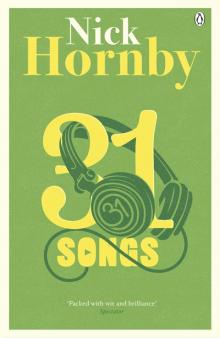 31 Songs
31 Songs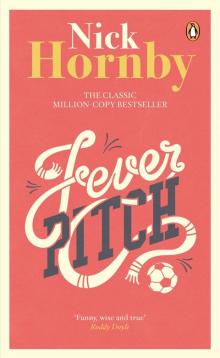 Fever Pitch
Fever Pitch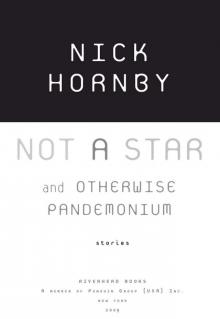 Not a Star and Otherwise Pandemonium
Not a Star and Otherwise Pandemonium The Complete Polysyllabic Spree
The Complete Polysyllabic Spree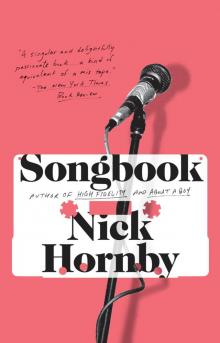 Songbook
Songbook An Education
An Education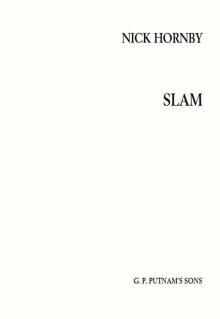 Slam
Slam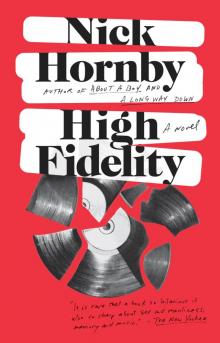 High Fidelity
High Fidelity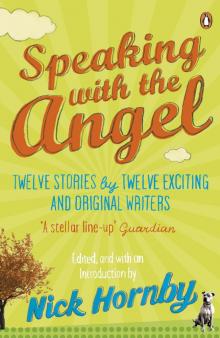 Speaking With the Angel
Speaking With the Angel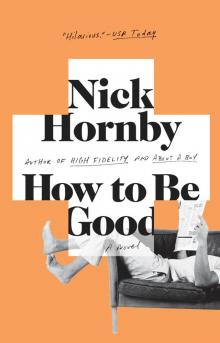 How to Be Good
How to Be Good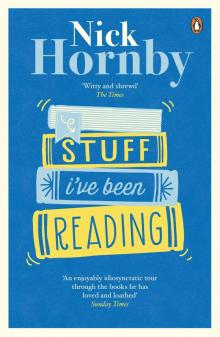 Stuff I've Been Reading
Stuff I've Been Reading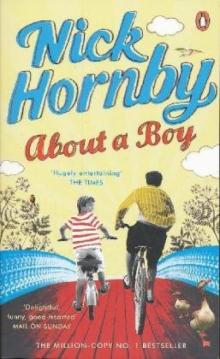 About a Boy
About a Boy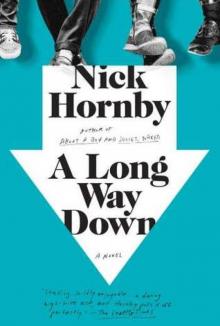 A Long Way Down
A Long Way Down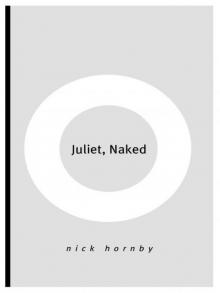 Juliet, Naked
Juliet, Naked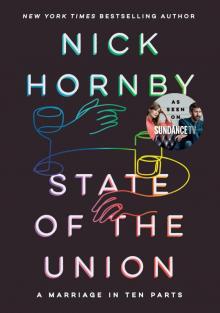 State of the Union
State of the Union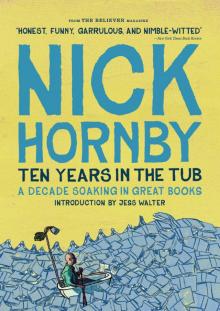 Ten Years in the Tub: A Decade Soaking in Great Books
Ten Years in the Tub: A Decade Soaking in Great Books Books, Movies, Rhythm, Blues: Twenty Years of Writing About Film, Music and Books
Books, Movies, Rhythm, Blues: Twenty Years of Writing About Film, Music and Books Just Like You
Just Like You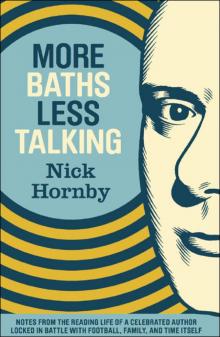 More Baths Less Talking
More Baths Less Talking Books, Movies, Rhythm, Blues
Books, Movies, Rhythm, Blues